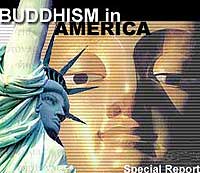Buddhism is made of more than meditation, monks and monasteries
By Quentin Kilpatrick, The BG News, February 4, 2010
Bowling Green, OH (USA) -- The Buddhism that comes to mind for many Americans -- ancient wise-men in robes, peaceful monks in isolated mountaintop monasteries and meditation -- is a romanticized and partial understanding of the religion.
 "Americans generally have a positive image of Buddhism and Buddhist meditation," said Madeleine Duntley, director of the Chapman Learning Community, whose Ph.D. is in religious studies. "They tend to associate it with peace, a lack of stress, and a feeling of one with the universe."
"Americans generally have a positive image of Buddhism and Buddhist meditation," said Madeleine Duntley, director of the Chapman Learning Community, whose Ph.D. is in religious studies. "They tend to associate it with peace, a lack of stress, and a feeling of one with the universe."
One of the most common misconceptions is that Buddhism is the only world religion that has never fought a war, Duntley said. This idea, she said, is absolutely false, as Buddhist-practicing countries have been fighting each other and others for centuries.
For many who come from a Judeo-Christian background, Buddhism is a radical departure from what is even considered religion.
"Buddhism is different in that its founder was not a God, so it's non-theistic," Duntley said.
Buddhism was founded by Siddhartha Gautama in the fifth century B.C. in India, according to important.ca, a Web site devoted to religion. The traditions were passed down orally for several centuries until they were written down.
Siddhartha Guatma is not seen as a god and he never claimed his teachings were divinely inspired. Because of this, Buddhism does not have a common scripture like Christianity or Judaism.
"He claimed to be not a personal savior, but a teacher to guide those who choose to listen," the Web site states.
Buddha, rather than a deity, is a title for any person who has been "enlightened," according to the Web site. So, like there have been many presidents of the United States, there have been many Buddhas.
Buddhism first entered the United States with Asian immigrants in the late 19th century, but it wasn't until the 1950s that it entered white American culture through the works of "Beat generation" writers like Jack Kerouac and Allen Ginsburg.
Since the 1960s, the United States has seen a growing number of "Seekers," or people who were raised in traditional Judeo-Christian backgrounds but converted to Buddhism.
"Buddhism tends to appeal to people who had been practicing another religion," Duntley said.
In Western cultures today, there is usually a split between the various ethnic forms of Buddhism practiced by immigrant communities and the Buddhism practiced by white converts, who tend to be wealthy and educated.
"In the West, it's generally an upper-middle class phenomenon," Duntley said, adding there are a large portion of converts who come from Jewish backgrounds.
Westerners drawn to Buddhism tend to be most interested in forms that emphasize meditation such as Zen and Tibetan, Duntley said, but Buddhism is not solely meditation and not all meditation is Buddhist.
The Buddhist influence, particularly meditation, has been secularized to some extent and incorporated into various psychotherapy treatments.
"One critique is that Americans change these Asian forms of Buddhism to suit their own cultures," Duntley said.

 "Americans generally have a positive image of Buddhism and Buddhist meditation," said Madeleine Duntley, director of the Chapman Learning Community, whose Ph.D. is in religious studies. "They tend to associate it with peace, a lack of stress, and a feeling of one with the universe."
"Americans generally have a positive image of Buddhism and Buddhist meditation," said Madeleine Duntley, director of the Chapman Learning Community, whose Ph.D. is in religious studies. "They tend to associate it with peace, a lack of stress, and a feeling of one with the universe."